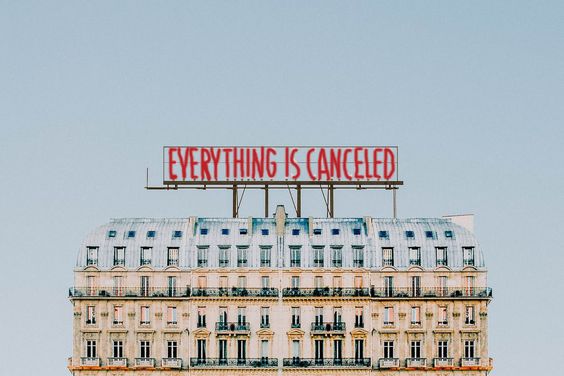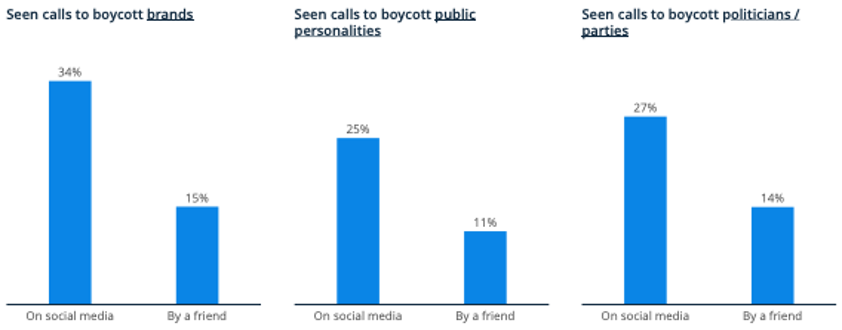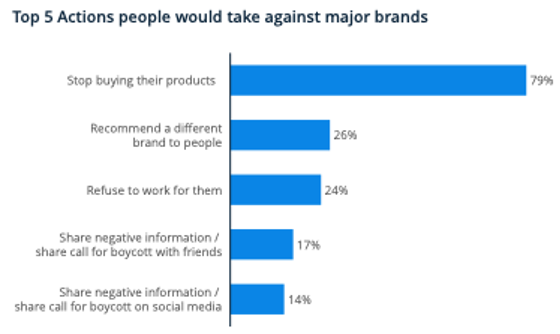What Is Cancel Culture And How Can Your Brand Avoid It?

-
categorySocial Media
-
authorChristine Faulhaber
-
dateNovember 25th, 2020
Ever wonder what the phrase, “they’ve been cancelled” actually means? Are you or your brand in danger of being cancelled? On October 22, 2020 we participated in Data on Stage, a webinar series presented by Statista on Cancel Culture. Director of Market Research, Nicolas Loose, presented on this emerging cultural phenomenon and shared his findings on Cancel Culture. Here are a few key learnings about Cancel Culture and what your brand can do to avoid being cancelled.
What is #Cancel Culture?
Cancel culture, also known as call-out culture, describes the modern grassroots movement of calling attention to questionable or negative actions or opinions by a brand or public figure. As social movements like #MeToo and Black Lives Matter have shed light on brands and public figures that many people do not agree with.
‘Cancelling’ happens when people stop supporting a brand or public figure as a result of an action or opinion held by the brand or public figure. Cancel Culture holds those in positions of power accountable for their actions and words and the easiest ways for consumers to take action against a brand is to speak with their wallets
Cancelling a brand can take the form of
- Boycotts
- Recommending similar brands
- Refusal to work for a company
- Sharing negative information or calls for boycotts with friends
- Sharing negative information or calls for boycotts on social media[i]
Who’s At Risk?
Businesses aren’t the only brands at risk of being cancelled. Personal brands, such as politicians and celebrates are also scrutinized in Cancel Culture. Getting cancelled is not uncommon, Statista found than one in every two consumers took some sort of cancelling ‘action’ against a brand in the last year, most of which happened online. [ii].
Who’s Doing the Cancelling?
Many consumers – especially those in Gen Z- are calling for brands to be cancelled. Social media has added an increased dynamic into the mix as people share calls to action against a brand or public figure.
Some facts to note:
- 55 per cent of men have taken action against a brand, while 45 per cent of woman have taken action against a brand[iii].
- Consumers from marginalized backgrounds are more likely to take action against a brand[iv].
- Those at both extreme ends of the political spectrum are also most likely to take action against a brand. [v]
Role of Social Media
Brands are at greater risk of being cancelled when calls for boycott on social media are seen by the public. Consumers overwhelmingly see calls to boycott on social media compared to being informed by friends, making social media a very important factor in the rise of Cancel Culture[vi].
Statista found that Twitter has the highest share of users taking actions against brands, followed by Tik Tok.

How To Avoid The Risk Of Being Cancelled
To avoid getting cancelled, brands should:
- look for a values-based connection with its consumers
- gain knowledge on your customers’ values and beliefs
- leverage your social media and insights teams to align better with your base of consumers
Don’t Be Afraid to Say You’re Sorry
If your brand does end up facing public backlash, think about your values and let your actions speak for themselves. Connect with your audience and apologize for any wrongdoing. Winning back consumers means listening to the public and making meaningful changes to rectify mistakes. All hope is not lost, Americans tend to boycott a brand first, but are also more likely to give that brand a second chance[vii]. According to Statista, consumers will go back to a brand they have boycotted if they believe the brand is making a change in its practices.
[i] Loose, Nicolas. Cancel Culture. Statista. October 22, 2020. Pg 26.
[ii] Loose, Nicolas. Cancel Culture. Statista. October 22, 2020. Pg 14.
[iii] Loose, Nicolas. Cancel Culture. Statista. October 22, 2020. Pg 18.
[iv] Loose, Nicolas. Cancel Culture. Statista. October 22, 2020. Pg 20.
[v] [v] Loose, Nicolas. Cancel Culture. Statista. October 22, 2020. Pg 20.
[vi] Loose, Nicolas. Cancel Culture. Statista. October 22, 2020. Pg 14.
[vii] Loose, Nicolas. Cancel Culture. Statista. October 22, 2020. Pg 31.
